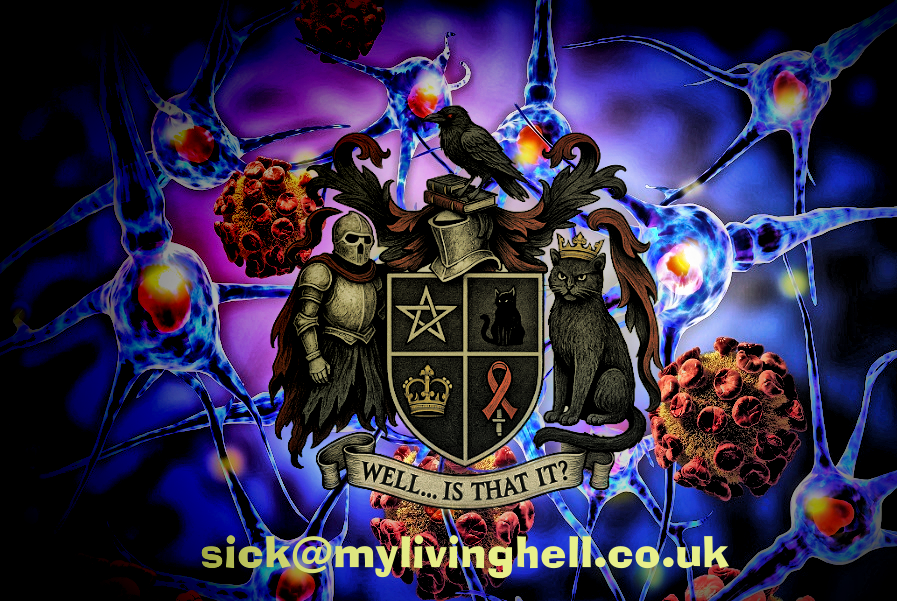- Posted on
- • Uncategorized
When Your Brain Betrays You Before Your Legs Do: MS Cognitive Symptoms Explained
- Author
-
-

- User
- sick
- Posts by this author
- Posts by this author
-
⚠️ Please read with care: This blog shares personal, sometimes painful experiences. My intention is to support and speak honestly not to harm. I’m not a professional, just someone who understands how hard it can get. If you're struggling, you're not alone please reach out for professional help.
When Your Brain Betrays You Before Your Legs Do
Multiple sclerosis has a knack for picking the cruellest, most intimate places to steal from you. People expect the visible the limp, the cane, the visible fatigue. Those feel negotiable: you buy different shoes, you learn new routes, you ask someone to carry the groceries. The invisible theft is nastier, because it takes things you don’t know how to replace: the steady line of your thoughts, the little plug that supplies the right word, the sense that you are the same person you were yesterday.
Let’s be blunt: cognitive changes in MS are terrifying. They are not a failure of will. They are not melodrama. They are neurologic reality. And they hurt in a way that doesn’t leave bruises but hollows you out.
What it feels like - Thought drift: mid-sentence, your mind steps out for a cigarette and forgets to come back. You re-read the same paragraph three times and still miss the point. - Word loss: it’s not just “on the tip of my tongue.” It’s watching language implode. Proper names vanish; everyday words hide like shy pets. - Slowed processing: decisions that used to be automatic now come wrapped in molasses. You have to consciously unspool what used to be seamless. - Short-term memory gaps: you can hold a story for decades but forget why you walked into the kitchen. - Emotional ripple effects: shame, anger, grief — often louder than the cognitive symptoms themselves.
Why this terrifies us Because our identity lives in memory and in the continuity of thought. When that continuity fractures, you don’t just lose a function — you lose the scaffolding that holds who you are. For everyone who’s felt this: the panic, the grief, the small, private funerals for who you used to be — it’s valid.
How to live with it (practical, not patronizing) These are not miracles. They’re tools, routines, and tiny rebellions that let you keep building a functioning life when the wiring is noisy.
Externalize memory
- Notes everywhere: short, clear labels. Notebooks, sticky notes, digital note apps — pick one and stick to it.
- Use alarms and timers for appointments, meds, and transitions.
- Photo prompts: snap pics of things you want to remember (where you parked, what you brought to an event).
Structure decisions
- Reduce friction: pre-plan meals, outfits, and errands.
- Decision rules: limit choices (two outfits only; one grocery list template).
- Routines become Armor: mornings and evenings on autopilot save cognitive energy.
Chunk tasks
- Break things into 10–20 minute blocks.
- Use checklists with visible progress markers.
- Allow micro-breaks — short rests reset attention.
Communicate with intent
- Tell trusted people what’s happening in simple terms: concrete examples and specific asks help.
- Use one-liners when you need help: “I need extra time,” “Please remind me in 10 minutes.”
Use tools that fit you
- Voice memos for ideas that evaporate.
- Text-to-speech and speech-to-text when reading or writing is hard.
- Calendar-sharing with a partner or friend.
Train, gently
- Cognitive rehab and occupational therapy can help re-train strategies; they’re not magic but they work for some people.
- Brain games? Use them as gentle practice, not cures.
Prioritize sleep and manage energy
- Fatigue amplifies cognitive issues. Rest strategically.
- Learn your “best hours” and schedule demanding tasks then.
Manage the emotional impact
- Let yourself grieve. Anger and panic are normal reactions, not failures.
- Find a place to be raw: a journal, a private blog, a therapist, or a safe online community.
- Celebrate tiny wins. Remember that progress isn’t always linear.
When you need to make hard choices Some losses demand adjustments: job changes, shifting responsibilities, planning for legal and financial contingencies. Those conversations are brutal but practical. Put important documents in order, name a trusted person for support, and consider professional advice early rather than waiting until a crisis.
Words to live by when it’s darkest - You are more than a symptom set. Cognitive changes do not erase your core worth. - Small systems beat big intentions. A single alarm is more useful than a perfect plan you can’t remember. - Humor helps when it can — and if it doesn’t, that’s fine. Crying is a strategy sometimes.
You are not alone This is not a vanity project or an isolated tragedy. Many of us know that fog, and we learn to navigate it together — trading tips, commiserations, and the occasional dark joke. If writing back at MS is your rebellion, keep writing. If whispering the small facts into your phone keeps your day tethered, do that. If you need to scream into a pillow, scream.
MS can take things. It will not get your entire story unless you let it. Keep the notebooks, the alarms, the friends who check in, and the words you refuse to lose. Keep writing, because every sentence you manage is a victory, and every honest post a beacon for someone else lost in the fog. Not today, MS. Not today.
I write in ink and fury, in breath and broken bone.
Through storm and silence, I survive. That is the crime and the miracle.
